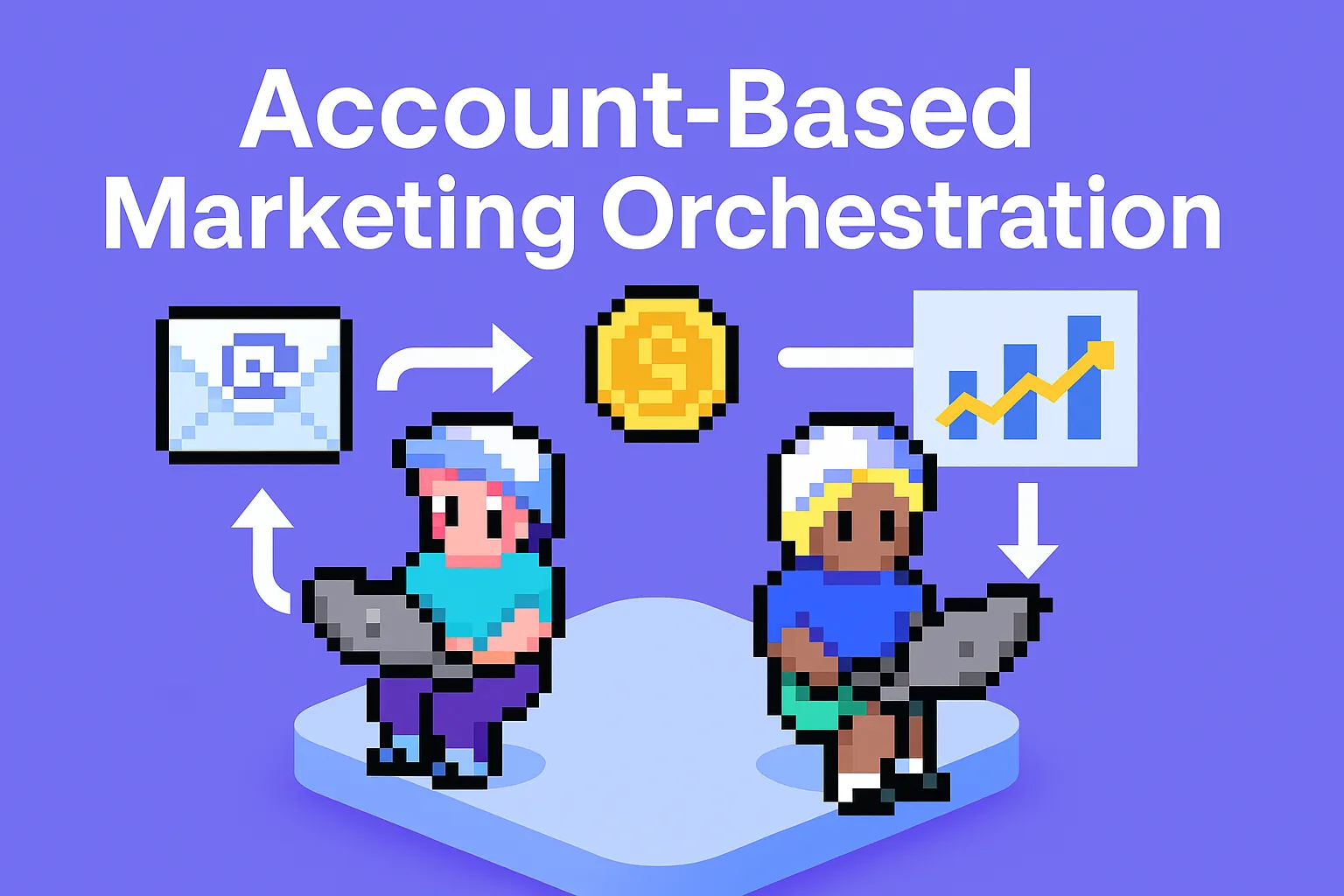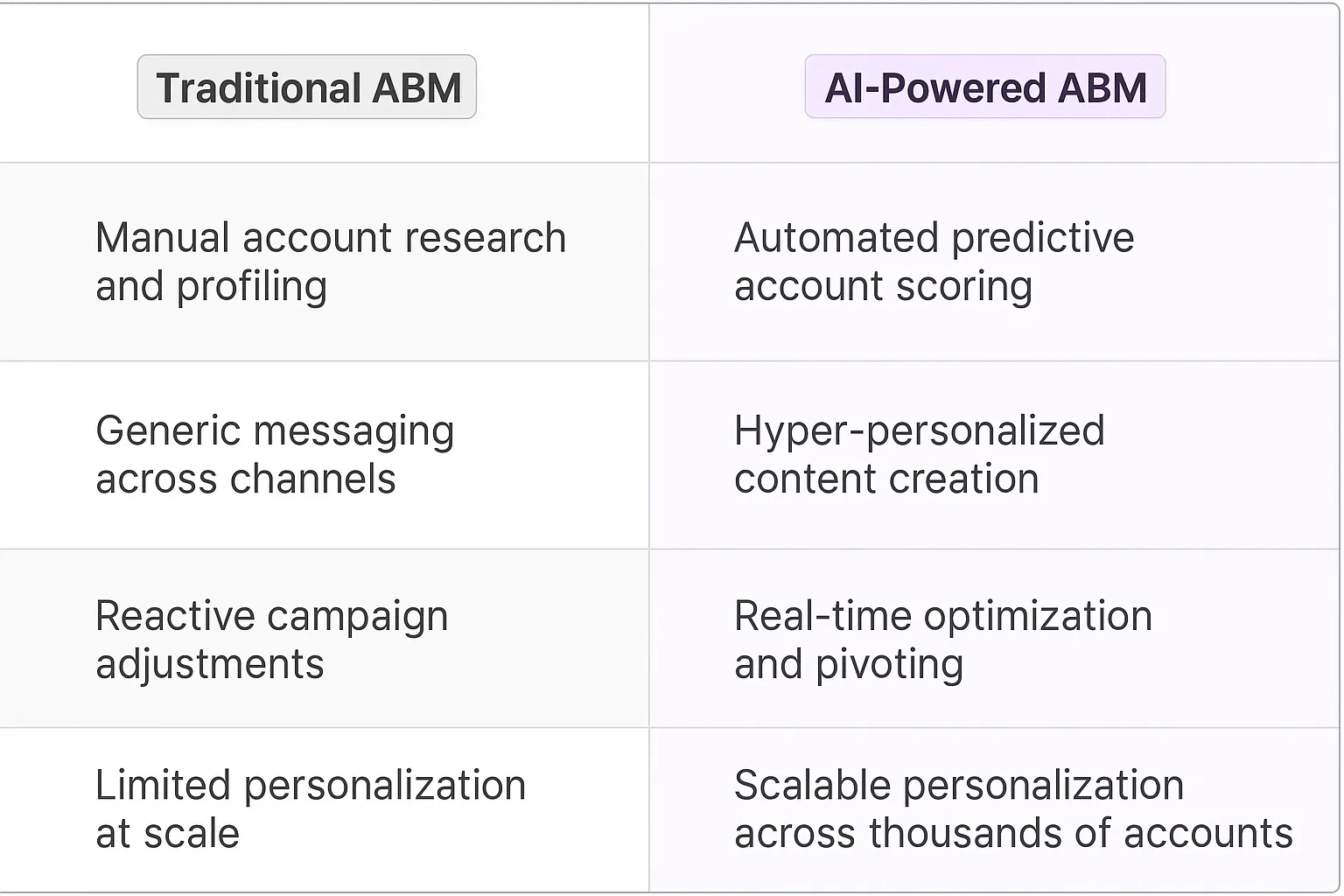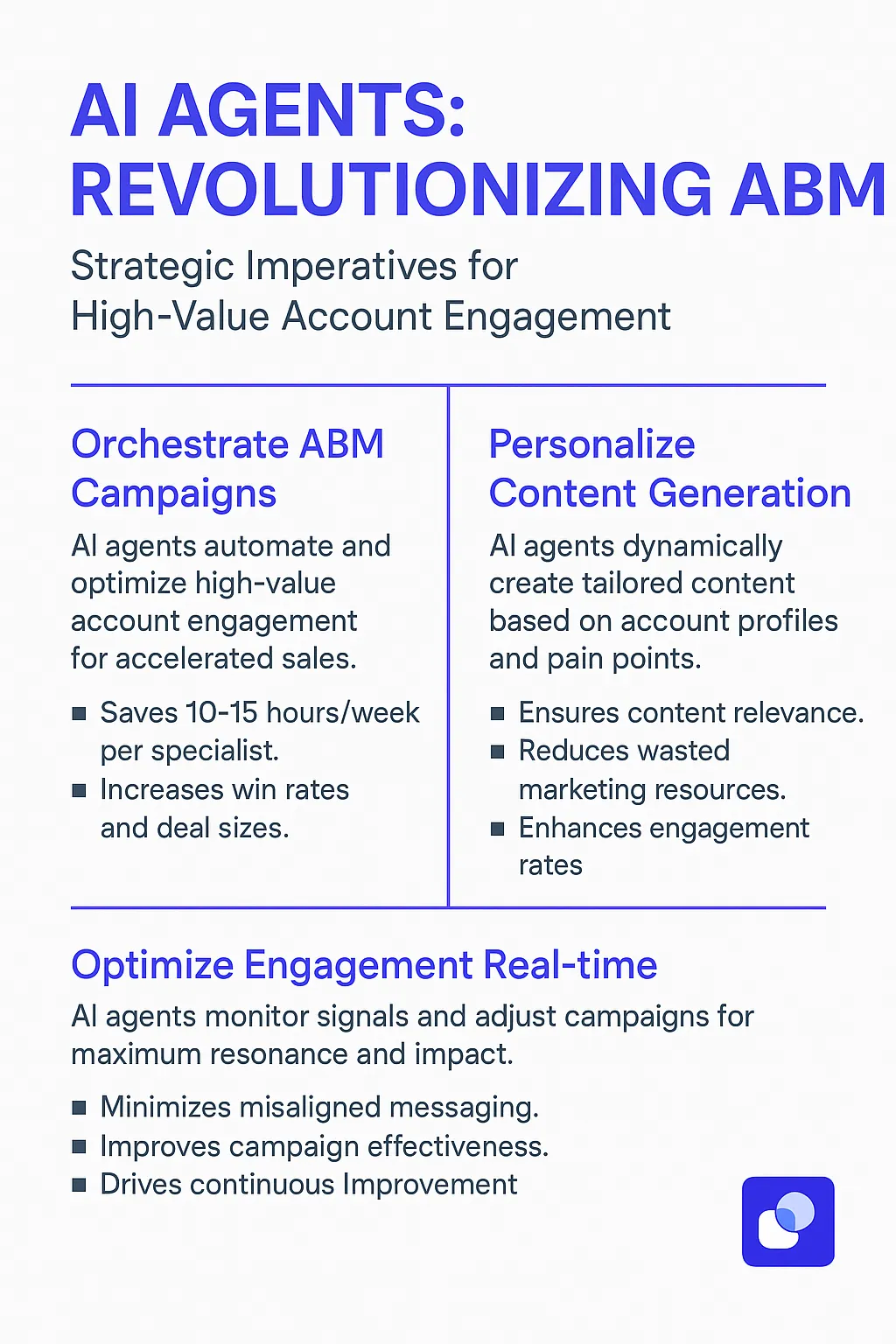Account-Based Marketing Orchestration AI Agents
The Evolution of Account-Based Marketing with AI Agents
What is Account-Based Marketing Orchestration?
Account-Based Marketing Orchestration is a strategic approach that aligns marketing and sales efforts to create personalized buying experiences for high-value target accounts. It's about treating individual accounts as markets of one, coordinating tailored messages across multiple channels to engage key decision-makers within these accounts. The goal is to drive engagement, accelerate sales cycles, and increase deal sizes.
Key Features of Account-Based Marketing Orchestration
The core features of ABM Orchestration include:
- Target account selection and profiling
- Personalized content creation and delivery
- Multi-channel campaign coordination
- Real-time engagement tracking and optimization
- Sales and marketing alignment
- Advanced analytics and reporting
With AI agents, these features are supercharged, enabling a level of precision, scale, and effectiveness that was previously unattainable.

Benefits of AI Agents for Account-Based Marketing Orchestration
What would have been used before AI Agents?
Before AI agents entered the scene, account-based marketing (ABM) orchestration was a manual, time-consuming process. Marketers relied on a patchwork of tools and spreadsheets to manage their ABM campaigns. They'd spend hours sifting through data, trying to identify high-value accounts and personalize outreach at scale. It was like trying to play chess while juggling – possible, but incredibly inefficient.
Teams would use basic automation tools, CRM systems, and marketing platforms that weren't specifically designed for ABM. The result? Fragmented workflows, data silos, and a lot of guesswork. Personalization was limited, and scaling efforts often meant sacrificing quality for quantity. It was the marketing equivalent of using a butter knife to cut through a thick steak – you'd get there eventually, but it wasn't pretty.
What are the benefits of AI Agents?
Enter AI agents for ABM orchestration, and suddenly we're operating in a different league. These digital teammates are like having a team of expert strategists working 24/7, but without the need for coffee breaks or sleep. They're transforming ABM from a high-effort, moderate-impact strategy to a high-impact, lower-effort game-changer.
First off, AI agents excel at pattern recognition and predictive analytics. They can sift through vast amounts of data to identify your ideal customer profile (ICP) with uncanny accuracy. It's like having a bloodhound that can sniff out your perfect prospects from miles away. This means your ABM efforts are laser-focused from the get-go, dramatically increasing your chances of success.
Personalization at scale becomes not just possible, but effortless. AI agents can analyze individual account behaviors, preferences, and pain points to craft tailored messaging that resonates. We're talking about the difference between sending a generic "Hey {FirstName}" email and delivering a message that feels like it was written by someone who's been shadowing the prospect for months.
The real magic happens in the orchestration itself. AI agents can dynamically adjust your ABM playbooks based on real-time data and responses. If a particular approach isn't working, they'll pivot faster than a startup after their first round of user feedback. This level of agility and responsiveness was simply not possible with traditional methods.
Moreover, AI agents bring a level of consistency and scalability that human teams struggle to match. They can manage hundreds or thousands of accounts simultaneously, ensuring that no opportunity falls through the cracks. It's like having a tireless army of account managers who never miss a beat.
Perhaps most importantly, AI agents free up your human team to focus on high-value, creative tasks. Instead of getting bogged down in data analysis and routine outreach, your marketers can concentrate on strategy, relationship-building, and crafting the kind of breakthrough ideas that AI (at least for now) can't replicate.
In essence, AI agents for ABM orchestration are not just an incremental improvement – they're a quantum leap. They're turning what was once a resource-intensive, hit-or-miss strategy into a precise, scalable, and highly effective approach to B2B marketing. It's like upgrading from a flip phone to a smartphone – once you experience the difference, there's no going back.

Potential Use Cases of AI Agents with Account-Based Marketing Orchestration
Processes
Account-based marketing (ABM) orchestration is ripe for AI-powered enhancement. These digital teammates can transform how B2B companies target and engage high-value accounts. Let's dive into some game-changing use cases:
- Predictive account scoring: AI agents can analyze vast datasets to identify which accounts are most likely to convert, allowing marketing teams to focus their efforts where they'll have the biggest impact.
- Personalized content creation: By understanding each account's unique pain points and interests, AI can generate tailored content that resonates with decision-makers at target companies.
- Cross-channel campaign coordination: AI agents can orchestrate consistent messaging across multiple touchpoints, ensuring a cohesive experience for target accounts as they move through the funnel.
- Real-time engagement optimization: These digital teammates can monitor account interactions and adjust campaign elements on the fly to maximize engagement and conversion rates.
Tasks
Breaking it down further, here are some specific tasks where AI agents can level up your ABM game:
- Account research and profiling: AI can scrape the web and internal databases to build comprehensive profiles of target accounts, including recent news, key decision-makers, and potential pain points.
- Intent signal monitoring: These digital teammates can track behavioral signals across various platforms to identify when accounts are actively researching solutions, allowing sales teams to strike while the iron is hot.
- Meeting scheduling and follow-ups: AI agents can handle the back-and-forth of scheduling meetings with prospects, as well as automate personalized follow-up sequences based on the conversation.
- Campaign performance analysis: By crunching the numbers on multi-channel ABM campaigns, AI can surface actionable insights on what's working and what needs adjustment.
- Competitive intelligence gathering: AI agents can keep tabs on your competitors' moves, alerting you to new product launches or messaging shifts that might impact your ABM strategy.
The beauty of these AI-powered use cases is that they free up human marketers to focus on high-level strategy and creative tasks. By offloading the data-heavy, repetitive aspects of ABM, teams can punch above their weight class and deliver personalized experiences at scale.
As these AI agents become more sophisticated, we'll likely see even deeper integration into the ABM workflow. Imagine AI that can predict which accounts are at risk of churning before they show any obvious signs, or digital teammates that can autonomously adjust campaign budgets based on real-time performance data.
The companies that figure out how to effectively leverage these AI capabilities in their ABM strategies will have a significant edge in the increasingly competitive B2B landscape. It's not about replacing human marketers, but rather augmenting their capabilities and allowing them to operate at a higher level.

Industry Use Cases
AI agents are reshaping Account-Based Marketing (ABM) orchestration, bringing a level of precision and personalization that was once unthinkable. These digital teammates are not just tools; they're game-changers that are redefining how businesses approach their most valuable accounts. Let's dive into some industry-specific scenarios where AI agents are making waves in ABM orchestration.
From tech startups to enterprise giants, companies are leveraging AI to craft hyper-targeted campaigns, analyze vast datasets in real-time, and engage decision-makers with unprecedented accuracy. These use cases aren't just theoretical – they're happening right now, transforming the ABM landscape and setting new standards for what's possible in B2B marketing.
As we explore these examples, you'll see how AI agents are becoming indispensable partners in creating, executing, and optimizing ABM strategies. They're not replacing human creativity and intuition; instead, they're amplifying these qualities, allowing marketers to operate at a scale and level of sophistication that manual processes simply can't match.
Fintech's ABM Revolution: How AI Agents Are Reshaping Customer Acquisition
The fintech industry is ripe for disruption when it comes to account-based marketing (ABM), and AI agents are leading the charge. Let's dive into how these digital teammates are transforming the way fintech companies target and acquire high-value customers.
Consider a mid-sized fintech startup specializing in blockchain-based payment solutions for e-commerce. Traditionally, their marketing team would spend countless hours manually researching potential clients, crafting personalized pitches, and hoping to hit the right notes. Enter ABM orchestration AI agents.
These AI-powered allies start by ingesting vast amounts of data from various sources - social media, financial reports, industry news, and company websites. They then use natural language processing and machine learning algorithms to identify patterns and insights that human marketers might miss.
For instance, the AI agent might notice that a particular e-commerce platform has been experiencing a surge in cross-border transactions but struggling with high fees and slow processing times. This insight becomes the foundation for a highly targeted ABM campaign.
The AI agent doesn't stop there. It goes on to craft tailored content for each decision-maker within the target company. For the CFO, it might emphasize cost savings and improved cash flow. For the CTO, it could focus on the technical elegance of the blockchain solution and ease of integration.
But here's where it gets really interesting: these AI agents can also predict the optimal timing and channel for each touchpoint in the ABM campaign. They might determine that the CFO is most receptive to LinkedIn messages on Tuesday mornings, while the CTO prefers detailed whitepapers delivered via email on Thursday afternoons.
As the campaign progresses, the AI agent continuously analyzes engagement metrics and feedback, fine-tuning its approach in real-time. It might notice that certain messaging resonates particularly well and automatically adjust future communications to double down on successful themes.
The result? A hyper-personalized, data-driven ABM campaign that feels incredibly human and relevant to each stakeholder. This approach not only increases conversion rates but also shortens sales cycles and improves deal sizes.
In the cutthroat world of fintech, where every advantage counts, ABM orchestration AI agents are becoming the secret weapon for companies looking to land those game-changing enterprise clients. It's not just about working smarter; it's about leveraging AI to create marketing campaigns that are truly greater than the sum of their human parts.
Retail's AI-Powered ABM: Turning Window Shoppers into Loyal Customers
The retail industry is undergoing a massive shift, and AI-driven account-based marketing is at the forefront. Let's explore how a cutting-edge department store chain is leveraging AI agents to transform their approach to customer acquisition and retention.
This isn't your grandmother's retail strategy. Gone are the days of broad-stroke marketing campaigns and hoping for the best. Today's retail leaders are using AI agents to create hyper-personalized, data-driven ABM campaigns that feel like they're reading customers' minds.
Take, for example, a luxury department store chain looking to boost its high-value customer base. Their AI agent starts by crunching massive amounts of data - purchase history, browsing behavior, social media activity, and even local events and weather patterns. It's not just about what customers buy, but why they buy it.
The AI identifies a segment of customers who frequently browse high-end products but rarely make purchases. It then digs deeper, uncovering patterns in their behavior. Maybe they're price-sensitive but value-driven, or perhaps they're looking for unique experiences rather than just products.
Armed with these insights, the AI agent crafts tailored marketing strategies for each customer segment. For the price-sensitive group, it might create a VIP program that offers exclusive discounts on luxury items. For the experience-seekers, it could generate personalized invitations to in-store events featuring their favorite designers.
But here's where it gets really interesting: the AI doesn't just create these campaigns - it orchestrates them across multiple channels with precision timing. It might determine that a particular customer is most likely to engage with Instagram Stories on Sunday evenings, while another prefers email newsletters on weekday mornings.
As the campaign unfolds, the AI continuously analyzes results and adjusts in real-time. If it notices that customers are responding particularly well to video content, it might automatically shift resources to produce more video-based marketing materials.
The results? Conversion rates that would make traditional marketers' heads spin. We're talking about turning casual browsers into loyal, high-value customers at a rate that was previously unthinkable.
But it's not just about the numbers. These AI-driven ABM campaigns are creating deeper, more meaningful relationships between brands and customers. It's the difference between feeling like you're being sold to and feeling like a brand truly understands and values you.
In the hyper-competitive world of retail, where customer loyalty is gold, AI-powered ABM isn't just a nice-to-have - it's becoming the price of entry for serious players. The future of retail belongs to those who can harness the power of AI to create marketing experiences that are truly greater than the sum of their human parts.
Campaign performance analysis becomes crucial in this environment, allowing retailers to continuously optimize their approach and maximize ROI.
Considerations
Technical Challenges
Implementing an Account-Based Marketing (ABM) Orchestration AI Agent isn't a walk in the park. It's more like trying to solve a Rubik's Cube blindfolded while riding a unicycle. The technical hurdles are real, and they're not for the faint of heart.
First off, data integration is a beast. You're dealing with multiple data sources - CRM, marketing automation, intent data, firmographics - and you need to wrangle them into a coherent, unified view. It's like trying to get a bunch of cats to march in a straight line. Your AI agent needs to be a data polyglot, speaking the language of each system fluently.
Then there's the challenge of real-time processing. ABM isn't a set-it-and-forget-it game. It requires constant adjustments based on the latest account interactions and market signals. Your AI needs to be quick on its feet, processing and acting on data faster than a caffeinated day trader.
Let's not forget about scalability. As your ABM efforts grow, your AI agent needs to keep up. It's like trying to upgrade the engines of a plane while it's in flight. You need an architecture that can handle increasing data volumes and complexity without breaking a sweat.
Operational Challenges
On the operational side, things get even trickier. You're essentially asking your organization to rewire its brain. Traditional marketing thinks in terms of leads; ABM thinks in terms of accounts. It's like asking a lifelong PC user to suddenly switch to a Mac.
Change management becomes crucial. Your sales and marketing teams need to learn to tango together in a way they've never done before. It's not just about adopting new tools; it's about embracing a new mindset. You're asking people to trust an AI to orchestrate complex, high-stakes marketing campaigns. That's a tough sell, especially for the old guard who've been doing things their way for decades.
Then there's the challenge of measuring success. Traditional marketing metrics don't cut it in the ABM world. You need new KPIs, new reporting structures, new ways of attributing success. It's like trying to judge a chess match using the rules of checkers. Your entire organization needs to recalibrate its definition of what good looks like.
Lastly, there's the ongoing challenge of fine-tuning and optimization. An ABM Orchestration AI Agent isn't a set-and-forget solution. It requires constant tweaking, training, and refinement. You're essentially raising a digital child, one that needs continuous education and guidance to reach its full potential.
Implementing an ABM Orchestration AI Agent is a journey, not a destination. It's a complex, multifaceted challenge that touches every part of your organization. But for those who can navigate these choppy waters, the rewards on the other side are immense. It's not just about doing marketing better; it's about fundamentally transforming how you engage with your most valuable accounts.
The AI-Powered Future of B2B Marketing
AI agents are not just enhancing Account-Based Marketing Orchestration; they're fundamentally redefining it. By automating complex tasks, providing deep insights, and enabling hyper-personalization at scale, these digital teammates are allowing B2B marketers to operate at a level of sophistication and effectiveness that was once unimaginable.
The examples from fintech and retail illustrate how AI-powered ABM is creating tangible, game-changing results across industries. However, it's crucial to recognize that implementing these solutions comes with significant technical and operational challenges. Success requires not just technological adoption, but a fundamental shift in mindset and organizational structure.
As we look to the future, it's clear that AI-driven ABM orchestration will become increasingly central to B2B marketing strategies. The companies that can effectively harness this power - navigating the challenges and capitalizing on the opportunities - will be the ones that thrive in the increasingly competitive B2B landscape. The revolution is here, and it's AI-powered.













